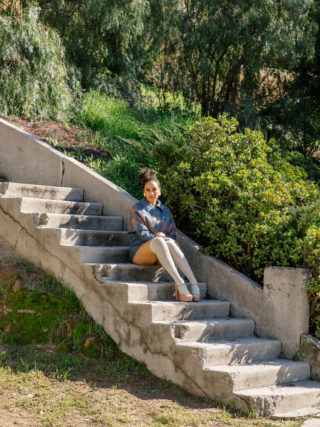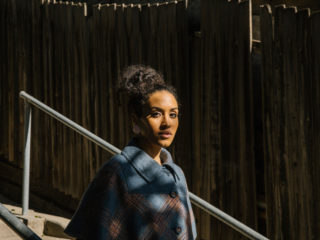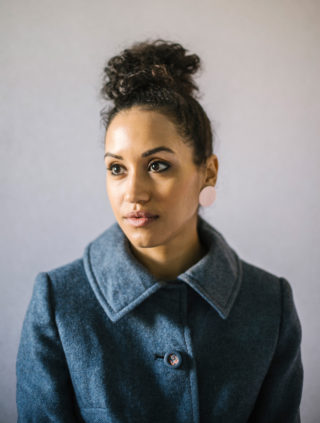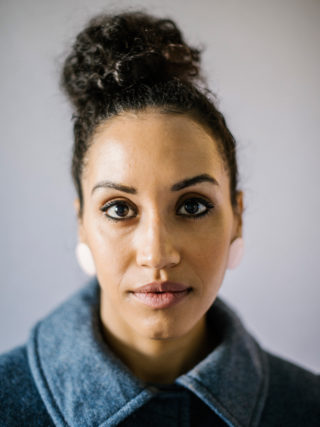Kadhja Bonet – the Los Angeles artist conjuring that 1940s Disney feeling
The storyteller who makes music that's sorrowful, wistful and touching

The storyteller who makes music that's sorrowful, wistful and touching
When I first hear ‘The Visitor’, Kadhja Bonet’s debut mini-album, it’s like the opening scene of an arthouse movie. I’m sat on my yellow sofa covered in a blanket, my legs folded up underneath me, laptop on my knees. The lights in my apartment are low and it’s dark outside. I’m feeling blue (because it’s January and on top of that some guy I had a few great dates with hasn’t texted back). Rain smashes against the windows, the orange glow from the street lamps makes the pavement – black and slick with rain – look like oil. I’m browsing emails and there’s one from my editor (Hi Stu!) with a one-line question (‘have you heard this lady?’) and a link to Soundcloud.
I’m not expecting much, but I press play and there’s this rousing, cinematic, string section – and then the singing: a full, grown-up voice, like something from the past; high and deep, sweet and smooth with a mournful crackle. It’s all my favourite things. It’s Billie Holiday, whisky and 1940s Disney. It’s hopeful yet sorrowful, wistful and touching.
Bonet grew up in a busy household, the middle child of seven siblings, whose father, a musician himself, encouraged her burgeoning interest in classical music. She is loathed to attribute her creativity to her large family (“I have no idea if I’d be the same person if I was in a house with three kids or seven kids”), but she does acknowledge that the busy-ness of her childhood meant she often found sanctuary in making art. “It was so hectic in our house,” she says. “Maybe my brothers were monopolising the TV or whatever, so I was just like, ‘I’ll build something with recyclables!’”
Bonet laughs when I tell her about the Disney nostalgia during my listening experience. “I think there’s definitely a truth to that. I think early Disney is one of [my] passive influences for sure. When I was growing up I wasn’t permitted to listen to very many kinds of music. What we had was a lot of classical music and a lot of Disney movies.”

Although she played classical music throughout her childhood – mainly violin – by her late teens Bonet had started to find the rigidity and repetitiveness of the classical repertoire stifling. “You just play all these other composers’ work and a lot of times maybe they’re not even that relatable to you,” she says. “Sometimes they are. Sometimes they’re beautiful and soulful and amazing. But a lot of times you’re just like, ‘Oh well. Gotta play this again.’ I had about six years or maybe even more than that where I didn’t even touch my violin. And then at a certain point in college I felt completely empty. Like I wasn’t getting to express myself in the way that I was used to. I wasn’t getting the gratification I was used to getting and so I started just going back to [music].”
Finding a salve for her emptiness in creativity, Bonet taught herself guitar and started writing her own music. “I think coming from somebody who was playing classical music growing up, that was the piece that was missing – this, like, personal piece. So when I went back to music I came to it with the intention to make it more mine and to have a piece of it. So I started writing songs first. I started teaching myself guitar, trying to figure out what I wanted to hear. And writing. Writing more than even learning the guitar. I’m not a very good guitar player, but I use it to write with. And I kind of like that I don’t know how to use it properly because it forces you to think for yourself, I think.”
Given her evocative singing voice, the first surprising thing when I speak to Bonet, is how she sounds. That rich tone, thick with the sorrowful amber of experience, is light and cheerful. She seems happy, despite the unfolding political turmoil gripping the USA in the days surrounding our interview (Bonet is based in LA). “The world has gone mad for sure,” she says, when I ask her for her thoughts on Trump’s inauguration. And then, refreshingly, “But I don’t think that I necessarily have anything fruitful to offer the political discussion. I definitely won’t make it a secret that this is the weirdest election and president we’ve ever had. In the US anyway. But I just don’t have anything of value to offer the political discussion right now. I don’t know how to fix anything that’s wrong.”
The second surprising thing is her modesty. I kind of expect, when artists have such an obvious ability for expression in their chosen form, that there will be an underlying confidence that marks them out from the mortals. They must know, I always think, that they are better at this than the average person. But Bonet seems a little taken-aback when I ask her about her talent. “Oh, wow,” she laughs (she laughs a lot). “I don’t know that I do have a talent for it really. I’m still learning. There’s a lot of directions I want to grow in. A lot of ways I want to develop and be more skilful. I feel more like a storyteller than a musician, for sure.”
But surely, I say, the reception to the album so far – The Guardian placed her in their Future 50 and she’s received radio support from Lauren Laverne, Mary Anne Hobbs, Giles Peterson, Don Letts and others – has bolstered your confidence?
“I’m somebody who doubts my talent all the time,” she replies. “So a little positive reinforcement is definitely appreciated. But at the same time I try not to read about myself. I really don’t read about myself. And you know, to be honest, I don’t even like it if my boyfriend tells me that he likes something I’m working on. I can’t stand it. Because I feel like either criticism or praise during the creative process can derail you. Because I might have gone a different direction if I hadn’t got that reinforcement. In terms of where I feel I am now, with the reception, I really just want to put out more music. I wanna just keep going and keep evolving. Because, this first record that I put out, it’s almost like a tattoo. It’s like this is where I was then. Maybe it’s not exactly who I am now. But I’ll counter that with another tattoo I guess.”


Although I get the tattoo analogy, Bonet’s music seems less decisive than that. It’s a curious mix that intentionally evades a simple generic classification.
“I hate genres,” she says, when I quiz her on the infidelity of her music style. And then: “No. It’s not that I hate genres. I love records that clearly fit in certain genres. I hate that we have to label it. I definitely didn’t put a label on it. Honestly, I was really surprised when it came out to see the labels that people would put on it. I was like, ‘oh really, this is a folk record, or this is a jazz record?’ I didn’t necessarily go into it with that, so it’s always a surprise what people label it as.”
In its press release the album is described as ‘magical realism’. I wonder how far that literary genre really was an active influence.
Bonet laughs again. “I actually haven’t read that. But I definitely understand that. I think it’s kind of a mystic philosophy that I try to impart a bit. There’s so much wonder in magic and in us just being. And all of the chaos and hectic day-to-day… how we live today I think we forget how amazing it is that we’re here. And that everything is here. I know that sounds really corny but I think about it a lot, quite often. It’s definitely something I hope I can communicate with my music – a bit of just appreciation and gratitude and love for the wonder that we are.” She pauses, thinking through the implications of what she’s just said. “I don’t subscribe to any religion, but I feel like I’ve had to develop a way of looking at things for my own peace of mind and sanity over the years – it’s something that helps me.”
This spring Bonet will begin touring her album. She is coming to Europe, with dates in the UK (London, Sheffield and Manchester), Brussels, Paris and Amsterdam. There’s a festival tour in the summer, and then she hopes to join her boyfriend, Itai Shapira, the composer and musician who plays bass in her band, on his tour of Japan. There is a huge amount to look forward to, not least the completion of her second album. I wonder whether the looming deadlines are stressful for her, but no, she says. They’re more motivational. “Life is super short. I wanna make sure I’m staying on my targets.” You can’t help but wish the very best for Kadhja Bonet. She’s lovely, a rare talent with an optimistic modesty, and a soulful old-skool voice that makes you feel like the star of your very own movie.